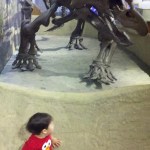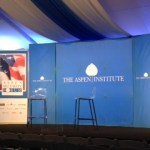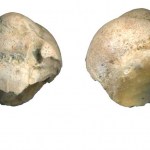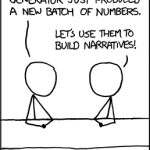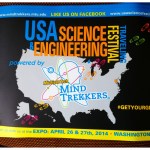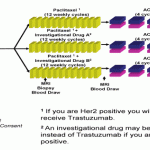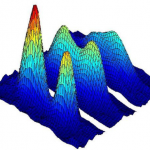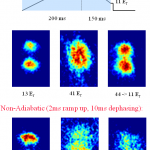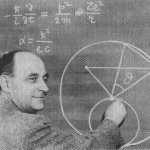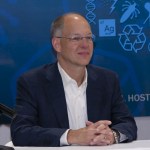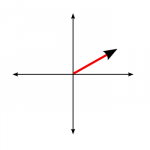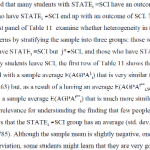Science
I'm starting to think that maybe I need to add "Work-life Balance" to the tagline of this blog, given all the recent posting about such things (but then, one of the benefits of having done this blogging thing for eleven years is that I know this is just a phase, and I'll drift on to the next obsession soon). Anyway, the genre of work-life blogging generally just picked up a new must-read post from Radhika Nagpal at Scientific American: The-Awesomest-7-Year-Postdoc or: How I Learned to Stop Worrying and Love the Tenure-track-faculty-life:
I’ve enjoyed my seven years as junior faculty…
After Thursday's post about sports and statistics, a friend from my Williams days, Dave Ryan, raised an objection on Facebook:
There's an unstated assumption (I think) in your analysis: that there is some intrinsic and UNALTERABLE statistical probability of getting a hit inherent in every hitter. If that is the case, then yes -- a hitter whose mean is .274 that hits .330 in the first half should, reasonably, be expected to regress towards the "true" outcome of .274 in the second half; and if the hitter winds up batting .330, it's a statistical outlier. But that ONLY applies if the underlying…
The kids and conferences issue, discussed here a while ago has continued to spark discussion, with a Tenure She Wrote piece on how to increase gender diversity among conference speakers and a Physics Focus blog post on a mother who wound up taking her toddler to a meeting. There are some good points in both, though the Tenure She Wrote poster seems to be in a field whose conferences run on a different model than that used for most meetings I go to.
The Physics Focus post was particularly interesting to me, though, because I spent last weekend as the portable conference day-care while Kate…
Ok, straight from cosmology to cybersecurity: the Aspen Institute is running an "Aspen Security Forum" with several days of events.
Tonight General Keith Alexander, head of the NSA is doing a forum with NBC's Pete Williams.
I got a ticket and got here early, as the heavens opened up and the lightning flashed. Despite the weather a lot of people are trickling in.
The Homeland Security folks are discretely tucked away behind the pavilion under the trees - seem to be trying to stay out of the rain.
Don't expect much news stuff, more here for curiousity and to hear the tone.
Aspen Institute…
It's not the Koh-I-Noor or the Empress Eugenie Brooch or whatever my wife is wearing right now, it's this:
It's a small, broken fossil shell, collected from a fossil outcrop and transported 110 kilometers to a hole in the ground in Italy. Close inspection reveals that before it was broken, there was a pattern of abrasion in one spot that suggests a hole had been drilled in it and a loop of sinew threaded through it. Although most of it has been worn away by time, bits of material in microscopic pits on its surface reveal that once, this shell had been painted with red ochre.
It doesn't sound…
One of the chapters of the book-in-progress, as mentioned previously, takes the widespread use of statistics in sports as a starting point, noting that a lot of the techniques stat geeks use in sports are similar to those scientists use to share and evaluate data. The claim is that anyone who can have a halfway sensible argument about the relative merits of on-base-percentage and slugging percentage has the mental tools they need to understand some basic scientific data analysis.
I'm generally happy with the argument (if not the text-- it's still an early draft, and first drafts always suck…
Thirty, almost forty, years ago when zebrafish were an up and coming model system and very few labs were working on them, we were used to going to conferences and reciting the zebrafish litany, a list of attributes that justified us working on such an oddball animal: we'd explain, for instance, that it was prolific, fast developing, and optically transparent, so we could see right into the nervous system in the living embryo. And you know, not once have I ever been asked the really simple and obvious question: if it's transparent, then how do see anything inside it?
I know. It takes a moment…
It's been a really long time since I've done a Dorky Poll here, but I'm pretty fried at the moment, so here's a kind of mathematical personality test: two numbers that do not uniquely define a sequence, but suggest some possibilities that reveal your innate character type and/or appropriate career path:
Personality Test: What number should come next in this sequence: 101, 1001,...?
Feel free to offer arguments for your chosen answer in the comments, and/or to speculate about what the hidden meanings of the options are. I'll explain the logic some other time.
(This might be too abstract for a…
I forget who pointed me to the Tenure She Wrote piece on mentoring, but it's something I've been turning over for a couple of weeks now. Probably because I became aware of it right around the time my two summer students started work last week. It keeps colliding with other conversations as well, though, so I may as well get a thinking-out-loud post out of the whole thing.
I told my summer students even before they started, back when they were just writing proposals to do summer research with me, that I'm going to be very hands-off with the whole business. This is at least partly a matter of…
By Mark Modzelewski
Washington, DC, July 15, 2013 – Science Spark has teamed with Michigan Technological University (Michigan Tech) to support the University’s Mind Trekkers traveling science festival as it heads out across America. The Mind Trekkers tour will culminate at the USA Science & Engineering Festival, supported by presenting host sponsor Lockheed Martin.
The traveling festival offers children of all ages the opportunity to engage in hands-on science, technology, engineering and math (STEM) activities. The first stop will be the National Scout Jamboree, July 15-24, 2013 at…
As I write this, I'm winging my way home from TAM, crammed uncomfortably—very uncomfortably—in a window seat in steerage—I mean, coach).
I had thought of simply recounting the adventures of the contingent of skeptics with whom I'm associated who did make it out to TAM to give talks at workshops and the main stage and to be on panels, but that seemed too easy. Also Orac is just too damned egotistical, and, besides, it's a four hour flight. Even so, I would be remiss if, before delving into the topic of today's post, I didn't praise Steve Novella, Harriet Hall, and Mark Crislip, for their…
I spend a lot of time promoting Rhett Allain's Dot Physics blog, enough that some people probably wonder if I get a cut of his royalties (I don't). I'm going to take issue with his latest, though, because he's decided to revive his quixotic campaign against photons, or at least teaching about photons early in the physics curriculum. We went through this back in 2008 and 2009 (though Rhett's old posts are linkrotted away, so you only get my side of the story...). I'm no more convinced this time around, even though he drags in Willis Lamb and David Norwood for support.
There are basically two…
Yesterday's write-up of my Science paper ended with a vague promise to deal some inside information about the experiment. So, here are some anecdotes that you would need to have been at Yale in 1999-2000 to pick up. We'll stick with the Q&A format for this, because why not?
Why don't we start with some background? How did you get involved in this project, anyway? I finished my Ph.D. work at NIST in early 1999, graduating at the end of May. I needed something to do after that, so I started looking for a post-doc by the don't-try-this-at-home method of emailing a half-dozen people I knew…
In Monday's post on squeezed states, I mentioned that I really liked the question because I had done work on the subject. This is, in fact, my claim to scientific fame (well, before the talking-to-the-dog thing, anyway)-- I'm the first author on a Science paper with more than 500 citations having to do with squeezed states. And since I've never written it up on the blog before, I'll leap on this opportunity to do some shameless self-promotion...
Well, aren't we Mr. Ego today? What's this paper that you're so impressed with about? I've never been all that good with titles, but I like to think…
There was a flurry of discussion recently on campus about "critical thinking," and how we sell that idea to prospective and current students. This was prompted by a recent report arguing for the importance of the humanities and social sciences (which I found really frustrating in ways that are neither surprising nor important for this post). This eventually led to a meeting on Monday this week to discuss this sort of thing, in the course of which one of our Deans mentioned an abandoned project to collect statements about the modes of thinking associated with particular disciplines, which I…
By Dr. Ray O. Johnson, Lockheed Martin senior vice president and chief technology officer
As the founding and presenting host of the third USA Science & Engineering Festival, Lockheed Martin returns to the 2014 Festival with inspiring, hands-on exhibits designed to drive excitement in our next generation of engineers, scientists, and technical professionals. The Lockheed Martin Experience promises to once again be a premier attraction at the Walter E. Washington Convention Center, located in the nation’s capital. We will bring fresh exhibits that provide an innovative engineering and…
In the Physics Blogging Request Thread the other day, I got a comment so good I could've planted it myself, from Rachel who asks:
It’s a term I see used a lot but don’t really know what it means – what is a “squeezed state”? What does “squeezing” mean? (in a QM context of course…)
I love this, not only because it gives me an excuse to talk about cool physics, but because it will let me engage in blatant self-promotion-- I have a Science paper on squeezed states, which I've never actually written up for the blog. So this post will be a great way to set up a future post, ResearchBlogging that…
There was another round of the "who counts as a scientist?" debate recently, on Twitter and then on the Physics Focus blog. In between those, probably coincidentally (he doesn't mention anything prompting it), Sean Carroll offered a three-step definition of science:
Think of every possible way the world could be. Label each way an "hypothesis."
Look at how the world actually is. Call what you see "data" (or "evidence").
Where possible, choose the hypothesis that provides the best fit to the data.
This isn't quite the way I would put it-- I'm an experimentalist where Sean's a theorist, so I…
There was a brief flurry of discussion yesterday kicked off by Matt Yglesias posting People Don't Major in Science—Because It's Hard, which more or less says what the title would lead you to believe (either title, since he's blogging for Slate where they like to give pages titles that don't match the post titles...). This was inspired by a National Bureau of Economic Research paper, the full text of which seems to be paywalled, sort of-- they emailed it to me at my work address for free. And since I could get it, I figured I should dig into it a bit to see what it really said.
I'm not going…
